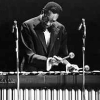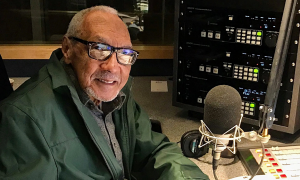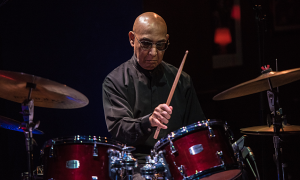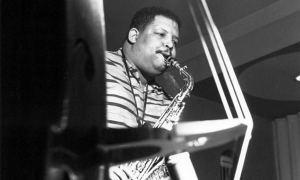Home » Jazz Articles » Big Band in the Sky » Remembering Quincy Jones: Music Is Like Water
Remembering Quincy Jones: Music Is Like Water

Courtesy Joe Alper
...it has as much to do with sociology as it does with culture. Whether it's gospel, blues or jazz, it all came from sociological circumstances.
—Quincy Jones
Though he began his career in the '50s as a jazz trumpeter, Quincy Jones may be best remembered as a highly successful producer, arranger and conductor—hats he wore with increasing frequency from the '60s onwards. As a producer, Jones was at the helm of Michael Jackson's Thriller (Epic, 1982), which would sell 70 million units in Jones' lifetime. As an arranger, Jones worked his magic for

Billy Eckstine
vocals1914 - 1993

Peggy Lee
vocals1920 - 2002

Ella Fitzgerald
vocals1917 - 1996

Frank Sinatra
vocals1915 - 1998

Sarah Vaughan
vocals1924 - 1990
In 1953, aged just 20, Chicago-born Jones toured Europe with

Lionel Hampton
vibraphone1908 - 2002

Dizzy Gillespie
trumpet1917 - 1993

Nat Hentoff
producer1925 - 2017
There were sideman gigs with

Clifford Brown
trumpetb.1930

Gigi Gryce
saxophone1927 - 1983

Art Farmer
flugelhorn1928 - 1999

Thad Jones
trumpet1923 - 1986
Over the next half century or so, Jones would shift easily between the worlds of jazz and pop music. He understood the source of all music—the links between all music. As Artistic Director of Montreux Jazz Festival in the early '90s Jones produced a number of memorable projects, including From Bebop to Hip-Hop in '91. Speaking to a private audience at the MJF in 2016 Jones said: "We were doing rap in Chicago in 1939, when I was five years old. Basically, it came from the Imbongi in South Africa thousands of years ago. You've got to know your roots," explained Jones.
An activist, Jones was one of the co-founders of the Institute for Black American Music, also co-founding the Black Arts Festival in Chicago. The Quincy Jones Workshop, which began life in the '70s, led educational projects for inner-city youth, though Jones' philanthropy extended beyond America's shores.
Education was important to Jones. Speaking with Arnaud Robert, author of 50 Summers of Music: Montreux Jazz Festival (Montreux Jazz Festival/Editions Textuel, 2016) at MJF 2016, Jones bemoaned the lack of a Minister of Culture in America. "We're trying to get a definitive curriculum in the schools because there's a very complex background to all the music and it would be nice if the kids knew what it was about, because it has as much to do with sociology as it does with culture. Whether it's gospel, blues or jazz, it all came from sociological circumstances."
Through MJF's educational programs Jones helped to launch or boost the careers of many young, aspiring musicians, mentoring among others

Joey Alexander
pianob.2003

Andreas Varady
guitarb.1997

Benny Carter
saxophone, alto1907 - 2003

Clark Terry
trumpet1920 - 2015

Ray Charles
piano and vocals1930 - 2004
It is for his music that Jones will be best remembered by millions around the world. In a long and garlanded career Jones composed and arranged for

Cannonball Adderley
saxophone1928 - 1975

Count Basie
piano1904 - 1984

Herb Alpert
trumpetb.1935

Louis Armstrong
trumpet and vocals1901 - 1971

Tony Bennett
vocals1926 - 2023

Betty Carter
vocals1929 - 1998

George Benson
guitarb.1943

Milt Jackson
vibraphone1923 - 1999
He wrote film scores for several dozen films, among which In The Heat of the Night and In Cold Blood (both 1967), The Italian Job (1969) and The Color Purple (1985).
In 2010 Jones released Q Soul Bossa Nostra (Qwest), the final album in his name. His role was as an arranger on songs associated with him over more than half a century. The roll call of artists who lined up to pay tribute to Jones—Talib Kweli, Akon, John Legend, Snoop Dogg, LL Cool J, Mary J. Blige, Q-Tip, Wyclef Jean and Amy Winehouse—spoke volumes for his influence on popular music.

Stevie Wonder
vocalsb.1950

Kamasi Washington
saxophoneb.1981
Recalling a State Department tour with Dizzy Gillespie to Cyprus and the former Yugoslavia in '56, Jones hailed the power of music to bring people together. For Jones, however, music was more than social glue. Much more. "Music is powerful stuff," he said. "It's like water; could you go a week without music?"
Quincy Jones: March 14, 1933—November 3, 2024.
Tags
Comments
PREVIOUS / NEXT
Support All About Jazz
 All About Jazz has been a pillar of jazz since 1995, championing it as an art form and, more importantly, supporting the musicians who make it. Our enduring commitment has made "AAJ" one of the most culturally important websites of its kind, read by hundreds of thousands of fans, musicians and industry figures every month.
All About Jazz has been a pillar of jazz since 1995, championing it as an art form and, more importantly, supporting the musicians who make it. Our enduring commitment has made "AAJ" one of the most culturally important websites of its kind, read by hundreds of thousands of fans, musicians and industry figures every month.
Go Ad Free!
To maintain our platform while developing new means to foster jazz discovery and connectivity, we need your help. You can become a sustaining member for as little as $20 and in return, we'll immediately hide those pesky ads plus provide access to future articles for a full year. This winning combination vastly improves your AAJ experience and allow us to vigorously build on the pioneering work we first started in 1995. So enjoy an ad-free AAJ experience and help us remain a positive beacon for jazz by making a donation today.

New York City
Concert Guide | Venue Guide | Local Businesses
| More...









 Buy Now
Buy Now




















